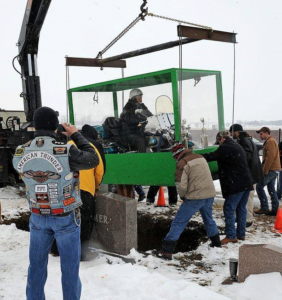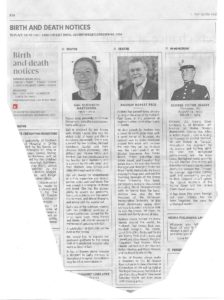March 13: Many years ago, I developed the habit of reading the obituary section in the Globe and Mail. Although the standard joke is that people of my advanced age do so to ensure that they are not listed, I likely started reading them simply because they were found between the sports section and the Sudoku puzzle. Over time though, reading them has become part of my routine.
In a somewhat strange way, they can be quite enlightening. Obituaries are now likely to be mini-biographies of the deceased. In my memory, those of years ago were much less elaborate, simply stating “so-and-so died on this date and will be buried here. Donations can be made to this charity.” With the passing of “the greatest generation”, many started to include references to the war or accomplishments in business or the arts. It then became de rigeur to include long lists of family members, dogs, cats and care-givers. Some expound on the hobbies of the deceased, or the personalities that made the deceased unique.
 A recent obit remembered that the deceased was a practical joker of some renown. It cited his last wish – that his family honoured – which was to wear a red clown nose during the open-casket visitation. I think I would have liked that guy. On the other hand, I was recently sent this picture of an 82-year-old Ohio resident being buried on his Harley “so that his friends could see him on his last ride”. You can draw your own conclusions about that one ….
A recent obit remembered that the deceased was a practical joker of some renown. It cited his last wish – that his family honoured – which was to wear a red clown nose during the open-casket visitation. I think I would have liked that guy. On the other hand, I was recently sent this picture of an 82-year-old Ohio resident being buried on his Harley “so that his friends could see him on his last ride”. You can draw your own conclusions about that one ….
Obituaries have also come to mark important moments in social change. Many will remember the obituaries for the husband and wife who died on the same day. While their obituaries spoke of a life-long love, it did not emerge until some time later that they had requested medically-assisted death due to terminal illness, and had died together holding hands. I have also recently seen several announcements that directly reference suicide, addictions or mental health issues as part of the deceased’s life, rather than camouflaging them with language about “suddenly after a long struggle”.
 All of these thoughts were triggered by the announcements shown here. I thought it was a really interesting snapshot of how obituaries have evolved both in form and in context. Two of the announcements mention same-sex partners. The third is a memoriam for a man who died in Vietnam in 1969. It’s remarkable to see these three together on the page as a reminder of how much things have changed since George Victor Jmaeff met his end in Quang Tri province, Vietnam, 50 years ago.
All of these thoughts were triggered by the announcements shown here. I thought it was a really interesting snapshot of how obituaries have evolved both in form and in context. Two of the announcements mention same-sex partners. The third is a memoriam for a man who died in Vietnam in 1969. It’s remarkable to see these three together on the page as a reminder of how much things have changed since George Victor Jmaeff met his end in Quang Tri province, Vietnam, 50 years ago.
Over the years, the dates that bracket the deceased’s time among us have shifted from my parents’ generation to include my own. Where I once read about the passing of decrepit geezers, I now read about fine young men and women of my own age being struck down in the prime of their lives. On occasion there has been the adrenaline shock of recognizing someone I knew. Although reading the obits will undoubtedly continue to be part of my morning routine, I am now beginning to approach them with a degree of respect and caution as well as curiosity.